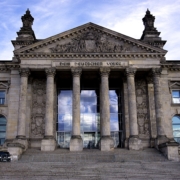Reich
The German noun Reich means a realm, empire, or kingdom, though the adjective reich means simply rich or wealthy. The totalitarian Nazi government of Germany 1933-45 described itself as The Third Reich, despite the absence of a clearly defined first or second Reich. Numerous compound words were in use at that time beginning with Reich, such as Reichsmark for the German mark currency, Reichsbahn for the German railways, Reichstag for the parliament building, and Reichskanzler for the German chancellor. After the defeat of Nazism in 1945 this use of Reich was not acceptable, as West Germany chose to describe itself as a Bundesrepublik, or federal republic, with Bund being used to form new compound words to replace the earlier Reich ones.
The separate socialist state of East Germany did, however continue to call their railways Deutsche Reichsbahn and the reunited Germany chose to retain the name Reichstag when the Bundestag, or federal parliament, moved from Bonn back into the famously reconstructed edifice in 1999.
The word reich is now sometimes found in English as a mocking and pejorative way to refer to a regime, government or state, and you may hear critical people saying something oppressive is “like the Third Reich.” In 2022 the term Reichsbürger emerged into international news after putsch plotters in Germany were arrested who described themselves as Reichsbürger, or imperial citizens, as they intended to instate a “monarchistic ruler”.




